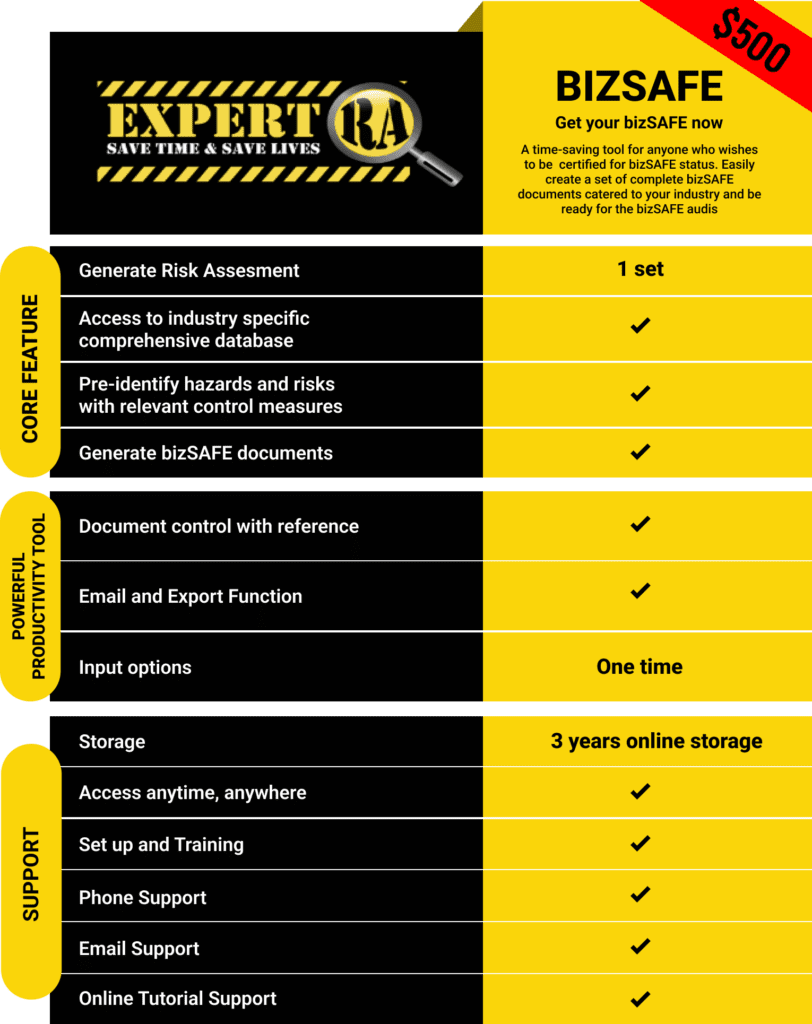Understanding BizSAFE: Enhancing Workplace Safety and Health in Singapore

Introduction
In Singapore, workplace safety and health (WSH) are paramount concerns for both employers and employees. The BizSAFE program, initiated by the Workplace Safety and Health Council (WSHC), plays a crucial role in promoting a safe and healthy work environment across various industries. This article delves into the concept of BizSAFE, its key components, benefits, and the impact it has on businesses and workers in Singapore.
What is BizSAFE?
BizSAFE is a holistic program developed by the WSHC to assist companies in enhancing their WSH capabilities. It aims to cultivate a strong safety culture within organizations, empower employees with relevant WSH knowledge, and reduce the number of workplace accidents and incidents. The program encourages companies to proactively manage WSH risks and hazards, ultimately creating safer workplaces for everyone.
Workplace safety and health (WSH) form the cornerstone of sustainable business practices in Singapore. Among the various initiatives aimed at fostering a safe working environment, BizSAFE stands out as a comprehensive program designed to empower organizations in managing WSH risks effectively. In this article, we delve into the intricacies of BizSAFE, exploring its core components, benefits, and the transformative impact it has on businesses and workers across industries.
Key Components of BizSAFE
- Risk Management
- Identifying hazards: Companies are encouraged to conduct thorough risk assessments to identify potential hazards in their workplaces.
- Risk evaluation: After identifying hazards, companies assess the level of risk associated with each hazard to prioritize control measures effectively.
- Risk control: Implementing control measures to eliminate or minimize identified risks, such as providing personal protective equipment (PPE) or implementing engineering controls.
-
WSH Management System
- Developing a comprehensive WSH management system: This includes policies, procedures, and practices that ensure WSH compliance within the organization.
- Establishing responsibilities: Clearly defining roles and responsibilities related to WSH, including appointing WSH coordinators or officers.
-
Training and Capability Development
- Training employees: Providing relevant WSH training to employees at all levels to equip them with the necessary knowledge and skills to work safely.
- Building capabilities: Encouraging continuous learning and development in WSH practices to improve overall safety performance.
-
Auditing and Assessment
- Conducting audits: Regularly auditing WSH practices and systems to identify areas for improvement and ensure compliance with regulatory requirements.
- Seeking external assessments: Companies may engage external auditors to assess their WSH management systems and provide recommendations for enhancement.
-
Recognition and Certification
- Achieving BizSAFE levels: Companies progress through different BizSAFE levels (BizSAFE Level 1 to BizSAFE Level Star) by fulfilling specific requirements and demonstrating commitment to WSH.
- Certification: Upon achieving a BizSAFE level, companies receive certification from the WSHC, which reflects their commitment to WSH excellence.
Benefits of BizSAFE
- Improved Safety Culture: BizSAFE promotes a culture of safety within organizations, leading to increased awareness, proactive risk management, and reduced incidents of workplace accidents and injuries.
- Regulatory Compliance: By implementing robust WSH management systems and practices, companies can ensure compliance with Singapore’s WSH regulations and standards.
- Enhanced Reputation: Achieving BizSAFE certification enhances a company’s reputation as a responsible and safety-conscious organization, which can attract clients, investors, and business partners.
- Reduced Costs: Proactive risk management and accident prevention lead to cost savings associated with medical expenses, compensation claims, and downtime due to accidents.
- Competitive Advantage: BizSAFE-certified companies gain a competitive edge in the market by demonstrating their commitment to WSH excellence, which can lead to increased business opportunities.
Impact of BizSAFE on Businesses and Workers
- Business Growth: BizSAFE certification opens up new business opportunities, as many clients and contractors prefer to work with certified companies due to their commitment to safety and quality.
- Employee Morale: A safer work environment boosts employee morale and productivity, as workers feel valued and confident in their safety at the workplace.
- Reduced Absenteeism: Fewer workplace accidents and injuries result in reduced absenteeism, leading to improved productivity and cost savings for companies.
- Lower Insurance Premiums: BizSAFE-certified companies may be eligible for lower insurance premiums, as insurers recognize their proactive approach to risk management and safety.
- Continuous Improvement: BizSAFE encourages continuous improvement in WSH practices, driving innovation and efficiency within organizations.
Conclusion
BizSAFE is a comprehensive program that significantly impacts workplace safety and health in Singapore. By promoting a strong safety culture, empowering employees, and implementing proactive risk management practices, BizSAFE-certified companies contribute to a safer, healthier, and more resilient workforce. The program’s benefits extend beyond regulatory compliance, leading to improved business performance, employee well-being, and industry standards. As more companies embrace BizSAFE, Singapore’s workplaces continue to evolve towards safer, more sustainable, and innovative environments.
Contact BizSAFE for more information.









